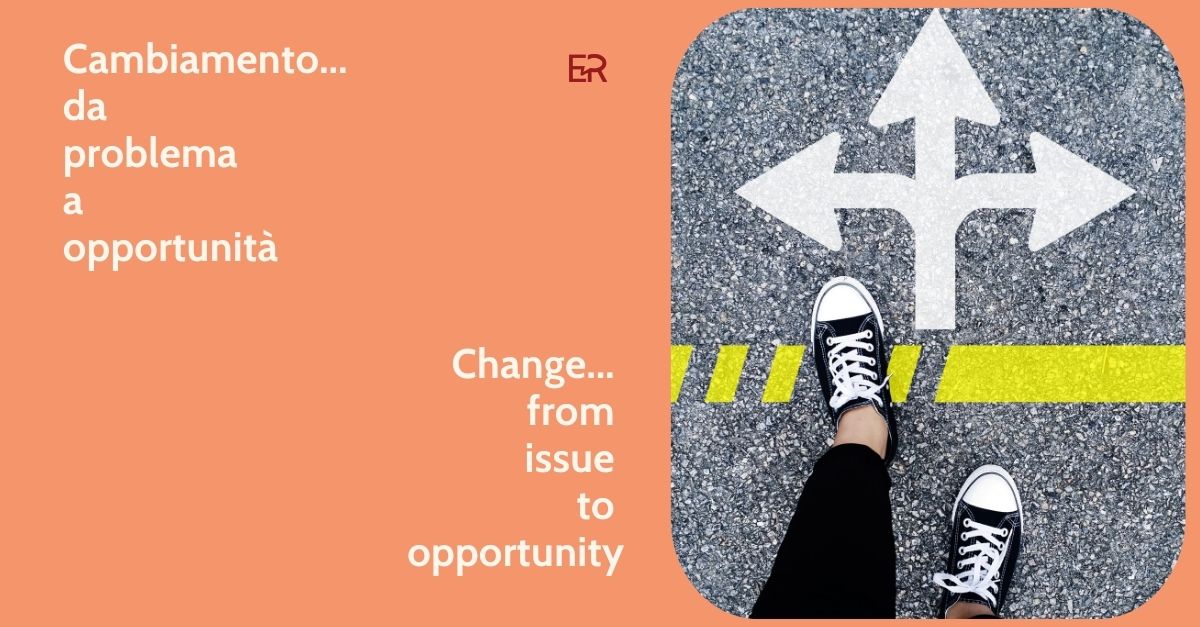
18 April 2024 Fear of change: an obstacle to changing job
The fear of change is often an obstacle to changing jobs with an impact on professional growth.
By not trying to face one's limits with a mindset of possible growth, one risks missing opportunities for knowledge, opportunities for improvement and professional growth.
Fear of change: the obstacle in these words
This is the dialogue that sometimes arises at the beginning of a coaching course...
Customer: Hi, I need your help.... I am very afraid to change jobs, even though my current situation no longer satisfies me. I don't know where to start and then, just the thought of facing a new environment and new people in another job, not to mention the fact that what I know how to do doesn't interest anyone...all this holds me back. What can I do?
Coach: Your fear is very common. To tell the truth, I have also experienced it at some point in my professional career. However, thinking back to how the mechanism of fear works, and also to all the opportunities one can miss out on just because of one's 'habit of doing what one has always done', it is a shame to let a few difficulties hold one back on one's professional path and even a few dreams....
So why not try to question fear and find strategies to overcome it, as well as to follow one's inclinations more consciously?
Professional change: changing the approach
On how to question fear you can read my article
Emotions and thoughts how to deal with them with coaching
Instead, in this article I want to provide some food for thought facing the fear of changing jobs, achieving different results, and planning one's career development.

Changing jobs: some strategies
Often the fear of change is dictated by a lack of information.
Then there are the insecurities of leaving something known and safe and fears of not living up to expectationsand you end up doubting your own abilities and professional value.
On these aspects it is possible to work with a career coach, but it is also possible to start working on them independently and, find out about available opportunities can be a good starting point.
Another way to start tackling what hinders change is without doubt to reason objectively about one's abilities and achievements.
This not only boosts self-confidence for what one has achieved in the present, but also stimulates the identification of new skills and abilities to focus on when changing jobs.
This opens up the possibility of attending training courses, workshops or seminars to acquire the desired skills, or to start networking with professionals to obtain support and mentorship in specific fields not yet explored.
Strengthening self-confidence against the fear of change
Self-confidence is built gradually over time, also by searching for information.
Strengthening self-confidence combines aspects related to curiosity and what beautiful things can come from the unexpected, but also others related to the way one does things.
For example, here are some ways in which to strengthen self-confidence:
- adapting to circumstances
- focus on the positive aspects of change and the new opportunities that will arise
- replace negative thoughts with positive but realistic statements, and confront anyone who can support and enhance what you are doing
- in setbacks, remember the reason that started the change and consider the developments that have taken place in the meantime, remembering why one is doing a certain thing or path
- focus on progress and achievements, however small, and on how to continue on the path towards the goal.

Planning for growth without the fear of change: 3 reflections
To facilitate change and ensure that it is not an obstacle, it is important to planning the steps, with 3 reflections and some questions.
1. Considering the pros and cons of each career option
Useful questions to consider the pros and cons of each career option and different job are for example:
How do you assess your level of experience, your qualifications and financial resources, your desired lifestyle and your work-life balance?
What are you willing to reconcile on?
2. Define exactly what you want to achieve
Here it is important to go into detail to understand how needs have changed over time and to allow time to feel exactly what you want to achieve.
Useful questions to this are:
What are your priorities in terms of salary, role and tasks, working environment and professional growth?
What do you want to get out of the new job?
3. Seeking opportunities with openness to different possibilities
Seeking opportunities with openness means evaluating the different options available according to
to your skills,
to your interests and goals,
widening the view rather than narrowing it.
You can do this by exploring different avenues, not limiting yourself to just one sector or type of work, and also by thinking about adjacent work activities in similar sectors but with distinct knowledge that can be supplemented with additional training and represent unique added value.
Consider for example the graphic designer and web designer: both professions create visual content for communication, however, graphic designers create logos, illustrations, and other graphic materials, while web designers create websites and user interfaces.
By deepening the specific knowledge of the skills in the two roles, why not offer a third possibility of application?
Facing the fear of change with new habits
Once the reflections have been completed, an action plan can be drawn up.
When creating the action plan for professional growth, it is important to establish the concrete steps to be taken, including all the necessary steps and the timeframe to achieve them.
The action plan should also referred to as new habits and behaviour facilitating change, finding a way to make change fun or rewarding.
The action plan will then have to be constantly revisited and updated in order to continue to nurture confidence and motivation.
Conclusion: what to do to overcome the fear of change
Ultimately, overcoming the fear of professional change is possible with the right preparation.
To transform the thought and experience of change from a problem to an opportunity, one needs to strengthen self-confidence, a good action plan and new habits.
Habits are able to hinder or facilitate change through adaptation and constancy.
It is therefore important to shift one's attention to how best to adapt to the situations that arise, and to persevere in building confidence.
... and the improvement will come as well as what you are trying to achieve ....
Also, don't forget to ask for help if necessary....
Don't let the fear of change hinder your professional growth
For more information read also
How to deal with professional change: transformation and realisation
Skills: discover what they are and how to map them
On the fear of change in business, you may also be interested in
Simon Sineck : Overcome the Fear of Change
